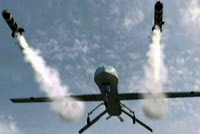On the record: I support drone strikes against anyone, including an American citizen, who wages war against the United States from outside the United States. Beats sending in military personnel who might get killed.
For those who are outragedby this some random questions:
1. In World War II, American citizens — difficult to find out how many — were in the Wehrmacht or SS fighting for Germany against the United States. Were they not legitimate military targets subject to being shot or bombed, the Constitution notwithstanding? If two German soldiers, one of whom was an American
citizen, manned a machine gun, would you have to treat them differently? Would shooting the German, but not the American, be OK? Would the American be entitled to constitutional due process even as he was shooting at U.S. military personnel? What about dropping bombs on a German unit that included American citizens in it? If it was known that an American was in an enemy unit as an armed combatant against the United States, would that mean the unit could not be attacked lest the American be killed without due process?
2. Assassination of enemy leaders during wartime is a legal military tactic. In April 1943, a squadron of U.S. Army P-38s ambushed and killed the architect of the Pearl Harbor attack, Japanese Adm. Isoroku Yamamoto. Was his death unconstitutional because the attack that killed him was carried out with stealth and no warning? If an American citizen was similarly engaged — say, as a uniformed general officer in an enemy army — would he not similarly be at risk? What’s the difference?
3. Anwar al-Awlaki was a natural-born American citizen who engaged in acts of war against the United States as a senior-level al Qaeda commander and operative. In 2011, he was killed by a drone strike in Yemen. Why was he entitled to civilian due process and not subject to the rules of war in the same way as Osama bin Laden? What would be the substantive difference between the two?
4. During wartime, who determines proper military tactics and rules of engagement — the president as commander in chief or lawyers and the courts?
5. Does it, or should it, make a difference that al Qaeda forces arestateless?
6. If the United States goes to war against a nation-state using conventional, uniformed armed forces, would it be unconstitutional to target known American citizens who were in enemy uniform and serving in or commanding enemy forces?
7. Does it make a difference if an act of war against the United States is committed on U.S. soil, like Antietam, MD (September 17, 1862, the bloodiest day in American history where 87,000 American citizens waged war against 45,000 Americans resulting in 22,717 American casualties, including 3,654 Americans dead) , or from a location not under the authority or control of the United States, like Yemen?
8. Was the American Civil War constitutional given that the United States waged war against U.S. citizens (see above)?
Just curious…
Tell ’em where you saw it. Http://www.victoriataft.com




